The Transatlantic Partnership Agreement led to a split in the public of Europe and the United States into two camps: opponents and supporters of the new alliance. The latter argue that future implementation of the project is beneficial for all interested parties, it will bring additional growth for the economies of the US and the EU. And opponents - anti-globalists and small entrepreneurs - believe that the Transatlantic partnership, on the contrary, will finally consolidate the dominance of international corporations in the world. Laws and borders are so far the only barriers that impede the realization of these goals. Who benefits from the Transatlantic Trade Partnership? We will try to understand this and other issues related to the new ambitious project of the West.
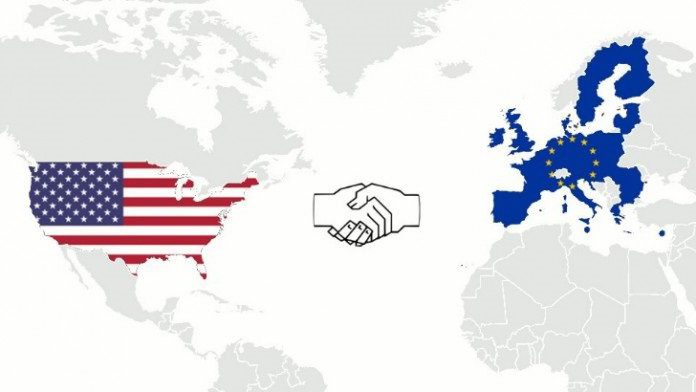
The concept
The Transatlantic Trade and Investment Partnership (TTIP) is a planned free trade agreement between the European Union and the United States of America. In fact, the agreement presupposes the future creation of a single market between the US and the EU, which is the first stage in the formation of a new powerful transatlantic state under the domination of large industrial corporations. Recall that the European Union was also created as an economic block with open markets between European countries. However, today we see that there has been a transformation from an economic organization to a political one, with the creation of a single decision-making center. Does the Transatlantic Partnership Expect Anything? And does he have a future at all? It will show time.
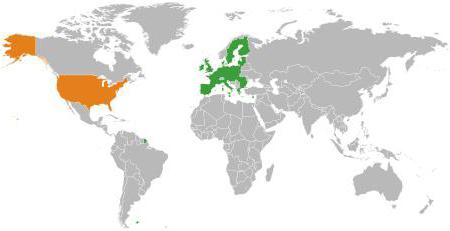
Transnational corporations as a threat to the existence of nation-states
The planned policy of Transnational Corporations (TNCs) to create a single global economic megablock has been going on for more than a dozen years. The transatlantic partnership is the quintessence of this policy, designed to completely neutralize state power and the states themselves as a barrier preventing full profit.
The EU and the US are already closely linked economically. However, TNCs continue to lobby for the creation of ever new transatlantic organizations with a minimal state role. Already today, such international economic communities as the World Trade Organization (WTO), the European-American Open Skies Agreement, the Transatlantic Free Trade Zone, and others have been created. However, local political protectionism still does not allow TNCs to fully realize all their plans. , despite lobbying for their interests by leading Western leaders - A. Merkel and B. Obama. It was the German Chancellor who publicly voiced the idea of World Trade in 2006.
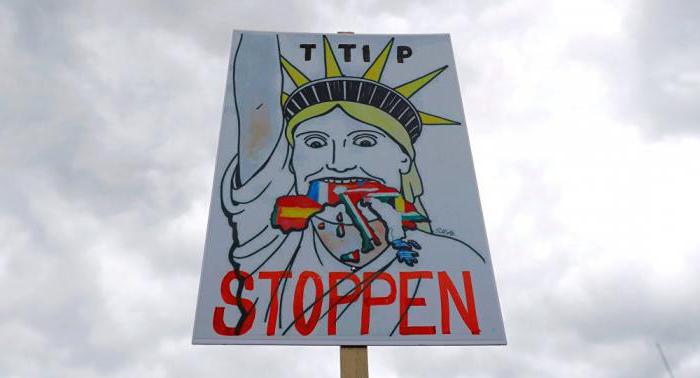
Transatlantic Partnership: History
Consider the history of the organization. The transatlantic trade partnership dates back to 1990. After the end of the Cold War, when the world ceased to be divided into two camps - socialist and capitalist, and the thought of the threat of mutual annihilation ceased to float in the air, the European community was the EU prototype, which included only 12 countries at that time, and the United States signed the Transatlantic Declaration ". The world has ceased to be afraid of nuclear war, and in nation-states with strong political power to protect against destruction, the need for TNCs has disappeared. Corporations realized that it was time to maximize profits from globalization and level out national protectionism policies.
Since 1990, TNCs have been active in creating an organization:
- In 1995, an initiative group was created - the Transatlantic Dialogue. It includes representatives of big business on both sides of the Atlantic.
- In 2007, the Transatlantic Economic Council was created. It includes the leaders of large corporations, and leading European and American politicians, including some heads of state.
- In 2011, a group of experts is created to recommend a large-scale free trade agreement.
- On February 12, 2013, US President Barack Obama in an annual appeal calls for the creation of a Transatlantic Partnership.
However, the final agreement has not been signed, and the project is “fading” after 2015.
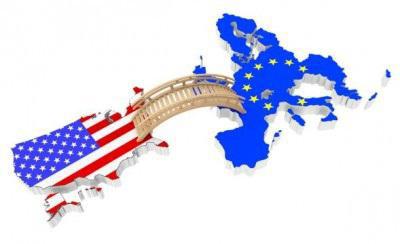
Text labeled “secret”
In the history of creating a partnership project - the actual opening of mutual borders to each other - between the EU and the United States the most questions arise as to why the final text of the treaty is kept in the strictest confidence. Why do this? And what do TNC representatives want to hide from EU and US citizens? This remains a mystery.
Many antiglobalists and opponents of this agreement are convinced that its true goal is the final rejection of nation states that create barriers for TNCs to maximize profits and ultimately enslave the population. Others argue that there is nothing unusual in such a secret: the Americans love secrecy, the same thing happened when another similar agreement was signed - the Trans-Pacific Partnership.
Agreement and Chamber of Secrets
To read the agreement in Washington and Brussels, special secret rooms were equipped in which documents with the final text of the agreement are stored. They can only include senior US senators and European parliamentarians. And even for their assistants access is closed. Cell phones and sound recorders are not allowed in secret rooms. It is forbidden to take notes on paper.
According to EU commissioners, such a US position is simply unacceptable in relation to Europe. Americans once again prove that they are masters of our planet and set the rules of the game themselves.
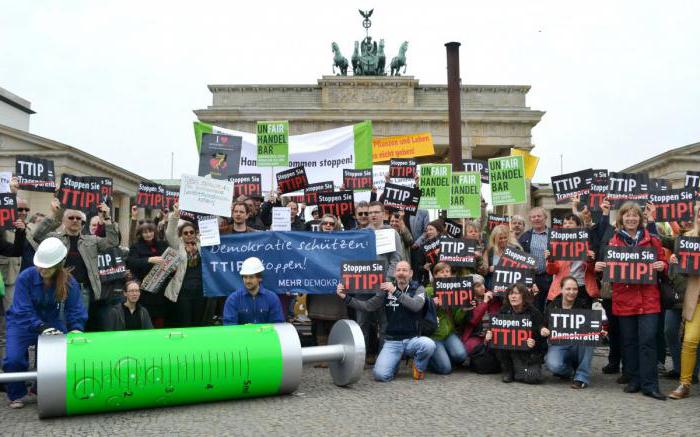
“In this room, there are no codes for our nuclear weapons, these are not CIA files, these are not documents that say that aliens have landed on us. No, the text of the trade agreement is located in this room, ”commented one of the leading public figures in the EU. All leading European media outraged, saying that the EU was losing its independence. Compounding the situation are numerous rallies of anti-globalists, who also claim that Europe will soon cease to exist as an independent political entity.
The mystery surrounding the final text of the treaty gives many reason to believe that the most “terrible myths” about the Transatlantic Partnership may actually turn out to be a harsh reality. We list them.
Myth One
TTIP is a common economic agreement that will lead to prosperity for both the US and the EU. It does not say anything about depriving countries of their independence, and all this is just a panic of the anti-globalists.
There are many questions about why the agreement is kept secret if it extends to 60% of global GDP. On the contrary, it should be open and transparent, if it really does not pose a threat to the loss of national sovereignty of some countries.
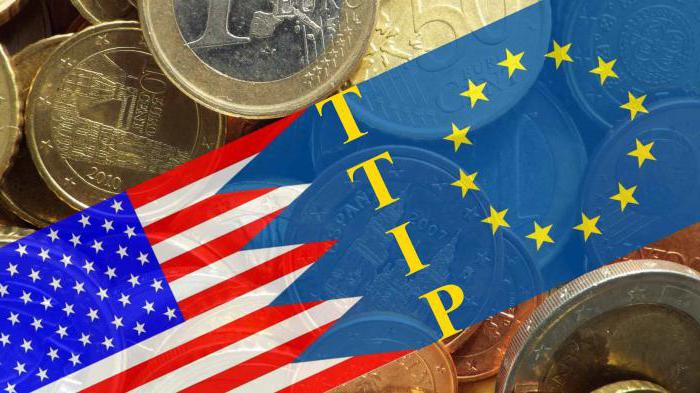
Second myth
The agreement is actively promoted by the leaders of large industrial states, therefore, it does not pose a threat.
Only those who did not live in our country in the early nineties of the last century can reason in this way. We saw with the example of our own state how several people from the political elite disposed of the property of a whole country, selling it for a penny.Many in the EU believe that their leaders have long begun to express the interests of not the majority of the population, but transnational corporations, lobbying for a particular solution.
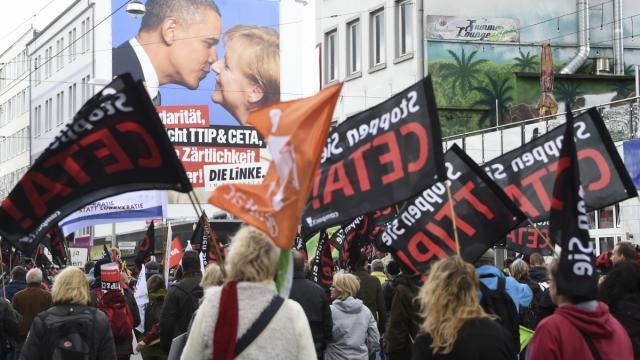
Myth three
The US has long ruled the EU. NATO troops under the command of the Americans are in Europe.
In fact, the presence of troops of another state in the country is not an indicator of occupation at all. Recall that once the troops of the USSR were also located throughout Eastern Europe, including the GDR, but this did not stop them from getting out of Soviet influence.
Myth Four
An economic free trade agreement does not give any political preferences.
Economic agreements strongly affect the political sphere and foreign policy of the state. Take, for example, Moldova - until recently, the political elite of this country occupied anti-Russian politics. The reason was that the country wanted to join the EU by signing the association agreement first. However, then it became clear that friendship with the West, on the one hand, quarreled Moldova and Russia, and on the other hand, caused enormous material damage to the economy. Now the new president of the already “fraternal to us Republic of Moldova” is actively tearing in the EAEU. He is the only foreign leader who attended the Victory Parade on May 9, 2017.
Will Europe remain independent?
The transatlantic and investment partnership will completely abolish the state sovereignty of the EU and the USA and finally establish the dominance of transnational companies by creating their own supranational judicial system. It is clear from the agreement that disputes between corporations and states will not be decided by the national courts of the countries, but by a specially created corporate court. Its decisions will be binding on any EU state, since supranational authorities and courts are considered superior to national ones. After the final signing and entry into force of the partnership, NTKs can push any initiative through the created corporate court:
- human cloning;
- mass introduction of biochips;
- active support for sexual minorities, etc.
These and other ideas can theoretically be tied to the "protection of economic interests" of TNCs.
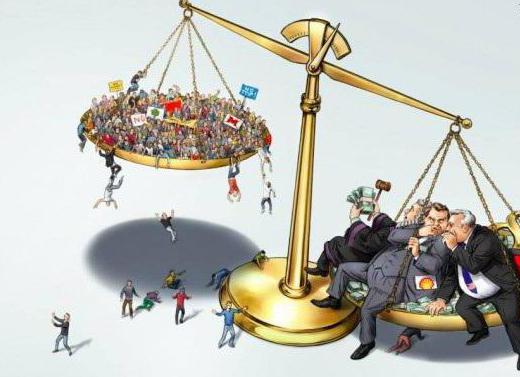
Is Donald Trump resuscitating the Transatlantic Partnership?
D. Trump in his election program promised to "make America Great again." The Transatlantic Partnership project was supposed to be finally buried. The United States intends to introduce almost a medieval policy of protectionism at home. However, the pre-election debate is a show, and they have no influence on the real state of affairs. Trump pursues his policy exactly the opposite of his campaign promises: in domestic politics, and in foreign, and in the economic sphere. Of course, he fulfilled his promise, and the United States withdrew from the Trans-Pacific Partnership, but the foreign policy associated with the Transatlantic Agreement was elevated to the priority status of the new “White House owner”.
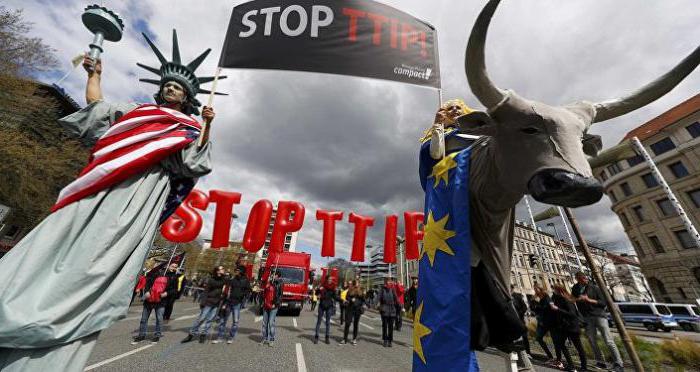
Active discussion of TTIP negotiations dealt a significant blow to British prestige. The United States made a choice not in favor of its "eternal ally." This is because Donald Trump reasoned in economic terms. He is not a politician, therefore, he is not interested in “centuries-old friendship”, future prospects of possible alliances that he does not understand, etc. He recruited successful businessmen into his team who can say with a hundred percent certainty whether the future agreement will bring profit or not. With the Trans-Pacific Partnership, it was immediately clear: for the United States, participation in it is unprofitable. Trump does not think about any areas of influence. The same can be said about the UK. Back in January 2017, British Foreign Minister Boris Johnson visited the United States, where he met with Trump's team. After returning home, he made it clear that the new "owner of the White House" Britain is not interested.